#Floréal
Explore tagged Tumblr posts
Text

Revolutionary honey
#Germinal#Louise Michel#French Revolution#Paris commune#Jules Vallès#Maxime Lisbonne#Eugène Varlin#Eugène Bizeau#off topic#Floréal#Prairial#Messidor#Thermidor
18 notes
·
View notes
Text
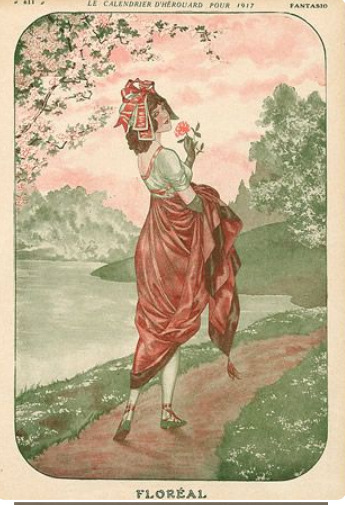
Floréal, 1917, Chéri Hérouard
2 notes
·
View notes
Text

Le Floréal , Watermael-Boitsfort - Anne Pierre de Kat , 1936.
Dutch , 1881-1868
Oil on canvas, 60 x 50 cm.
#Anne Pierre de Kat#dutch artist#garden city#Belgium#Watermael-Boitsfort#flourishing vegetation#Le Floréal#Brussels#spring
94 notes
·
View notes
Text
les mis fics always get me because les amis are just so. close. they all love each other so much and it’s so normal and so not a big deal i just want to sob
#like for example in you dance dreams (my fav) r lives with j/b/m#and they all just love each other so much and it’s not even weird that r lives with them he never feels excluded or lesser because he’s not#in the polycule and they want him there just the same and they LOVE him and he loves them and oh god i’m going to wail#or. another time floréal is like ‘now tell me how good i am at pole dancing so i can forget how sore i am’#and grantaire happily spends the rest of the walk home complimenting her in increasingly flowery ways#like. god. i am so jealous of r in this fic FUCKKKK#lu.txt#les mis
6 notes
·
View notes
Text
Oublier Fukushima
S’il y a un nouveau livre de référence sur cette catastrophe qui ne cesse d’avoir lieu, seconde après seconde, c’est bien Oublier Fukushima, paru aux Editions du bout de la ville. Il est signé par Julie Aigoin, Pierre E. Guérinet et Floréal Klein, qui s’effacent derrière le nom d’Arkadi Filine : c’est l’un des 800 000 liquidateurs auquel Svetlana Alexievitch donne la parole dans sa terrible…
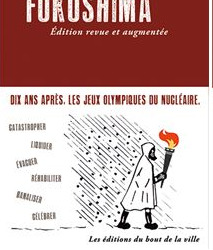
View On WordPress
#Alain Gras#Arkadi Filine#capitalisme thermo-industriel#Charles Gibrin#Editions du bout de la ville#Elisabeth Filhol#Floréal Klein#Fukushima Daiichi#hibakusha#Jean-Marc Royer#Julie Aigoin#La Centrale#La Supplication#Le choix du feu#Le monde comme projet Manhattan#Manuel de défense civile#mouvements antinucléaires#nucléocratie#Oublier Fukushima#Pierre E. Guérinet#Shinzo Abé#Svetlana Alexievitch#Tepco
0 notes
Text
Today I finally decided to check something a friend told me a while ago. It was about Robespierre allegedly supporting and pushing for a full scale invasion of Italy, an idea that came from his younger brother Augustin and Napoléon.
The evidence for such claim is mentioned in Mary Young's biography on Augustin Robespierre. This is what Young has to say about it:

(page 142).
So not only was Carnot - someone who's considered responsible for turning a war of defense into one of conquest by robespierrist historians - unexpectedly against the idea of invading Piedmont, but Maximilien Robespierre, even more unexpectedly, was pushing for it.
And there's more: at page 154 - 155, Young mentions, quoting a work by J. Colin, that the reason why the CSP fell apart was because Robespierre interfered with war affairs to the point of alienating Carnot. While the latter was indeed against invading foreign countries, Robespierre, on the contrary, approved it and wanted it to be accomplished:

So it seems like the story about great advocate of peace, Maximilien Robespierre, is indeed just a story...!
Because of course a historian, whose book presents a foreword by Marisa Linton, wouldn't completely intentionally or unintentionally twist and misunderstand sources, right?
Right!?
Wrong.
The sources which Young uses to support her ideas are from Histoire de la campagne de 1794 en Italie by Gabriel Fabry vol 2, p. 438 and L’Éducation Militaire de Napoléon by J. Colin. Let's give them a quick look.
Fabry's histoire simply reports a CSP decree showing a certain eagerness in wanting to invade Piedmont. The excerpt, as you can see, doesn't include any signature.

(pages 438 - 439.)
Since Young said that Robespierre approved it, one would be inclined to think that it was Maximilien who wrote and signed the decree, with his signature being the first one. Of course the handwriting and signature of a CSP member isn't absolute proof of approval, but I usually see these two things used as arguments to show that a CSP member agreed; even by reputed historians; so I wasn't surprised to see Young making such a bold assumption. I then checked Aulard's Recueil and surprise surprise that decree was written and signed by Carnot only. No trace of Robespierre:

(I underlined in cyan the part similar to what Fabry reported, since Aulard made only a summary of the decree.)
Concerning the fact that Carnot was opposed to Robespierre's - yes, because Colin considers it as such - warmongering plans, the latter mentions a letter dated 26 Thermidor, in which Carnot complains about it:

I happened to find that letter in Correspondance générale de Carnot vol. 4, p. 575 - 576:
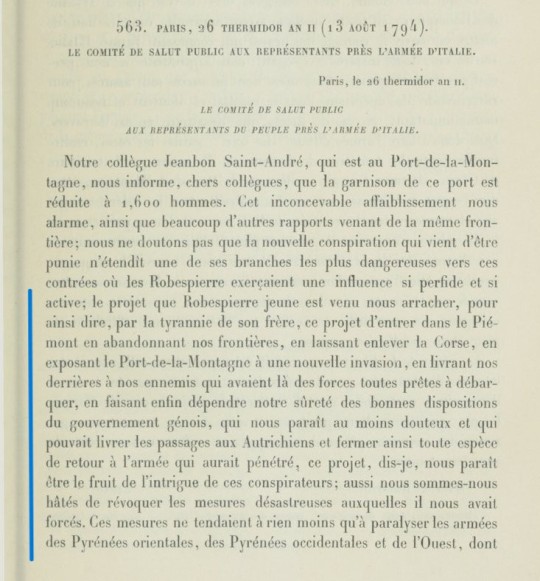
To sum up, it says that the plan comes from the mind of Augustin, but that it was the tyranny of his brother that inspired it.
Now, this is a letter written shortly after the fall of the Robespierrists, it doesn't take much to understand that this is purely thermidorian propaganda, not only because of its content, but also for the wording used. Moreover, it's not a personal letter, in which Carnot rambles with a friend or relative, it's an official one from the Committee of Public Safety.
Saying that Carnot didn't approve the conquest of Piedmont whereas Maximilien Robespierre did - I actually don't know if it was Augustin's idea, but this is not the point right now - is simply wrong since the decree of 19 floréal quoted above has been written and signed exclusively by him.
Thinking that a historian didn't care to double check their sources leading to such a misinformed mess is... truly appalling. This is proof of how one should always double check sources when possible, even if they come from historians we trust or appreciate!
Not that I personally trust or appreciate Young, considering that another of her bizarre claims based on dubious sources almost caused a sort of Thermidor in the community almost one year ago...
EDIT: Mary Young wasn't a historian, but a psychologist, so I did wrong in calling her as such. I do still think that someone of the reputation of Marisa Linton should have done a much better job in reviewing the book.
#frev#french revolution#mary young#augusting robespierre#maximilien robespierre#robespierre#lazare carnot
89 notes
·
View notes
Text
Preliminary Gayeties, Part 1
LAIGLE DE MEAUX, as the reader knows, lived more with Joly than elsewhere. He had a lodging, as a bird has one on a branch. The two friends lived together, ate together, slept together. They had everything in common, even Musichetta, to some extent. They were, what the subordinate monks who accompany monks are called, bini. On the morning of the 5th of June, they went to Corinthe to breakfast. Joly, who was all stuffed up, had a catarrh which Laigle was beginning to share. Laigle's coat was threadbare, but Joly was well dressed.

It was about nine o'clock in the morning, when they opened the door of Corinthe.
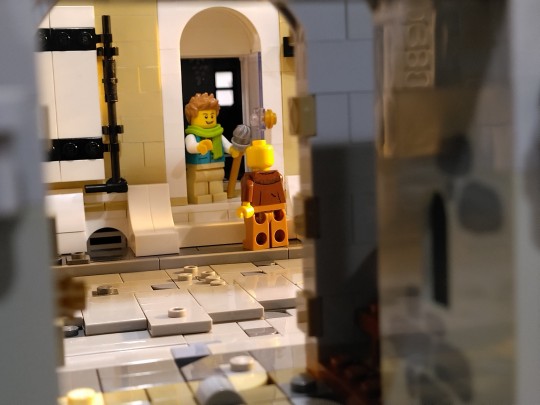
They ascended to the first floor. Matelote and Gibelotte received them.
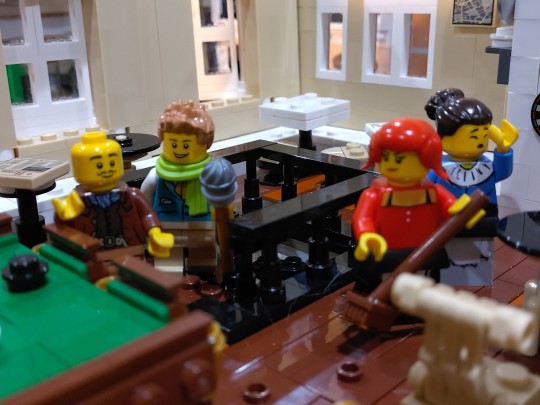
"Oysters, cheese, and ham," said Laigle. And they seated themselves at a table.
The wine-shop was empty; there was no one there but themselves.
Gibelotte, knowing Joly and Laigle, set a bottle of wine on the table.
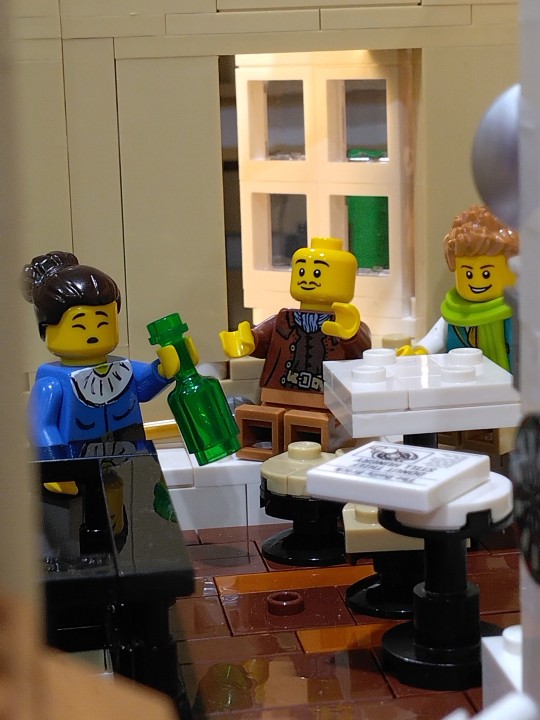
While they were busy with their first oysters, a head appeared at the hatchway of the staircase, and a voice said:
"I am passing by. I smell from the street a delicious odor of Brie cheese. I enter." It was Grantaire.
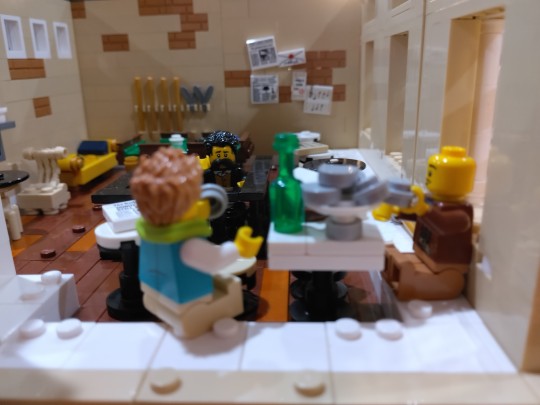
Grantaire took a stool and drew up to the table.
At the sight of Grantaire, Gibelotte placed two bottes of wine on the table. That made three.
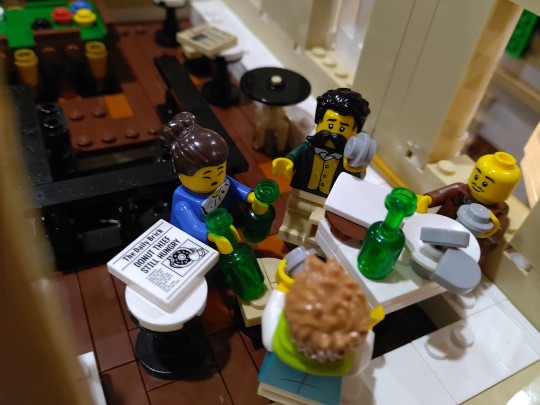
"Are you going to drink those two bottles?" Laigle inquired of Grantaire.
Grantaire replied, "All are ingenious, thou alone art ingenuous. Two bottles never yet astonished a man."
The others had begun by eating, Grantaire began by drinking. Half a bottle was rapidly gulped down.
"So you have a hole in your stomach?" began Laigle again.
“You have one in your elbow," said Grantaire. And after having emptied his glass, he added: "Ah, by the way, Laigle of the funeral oration, your coat is old.”
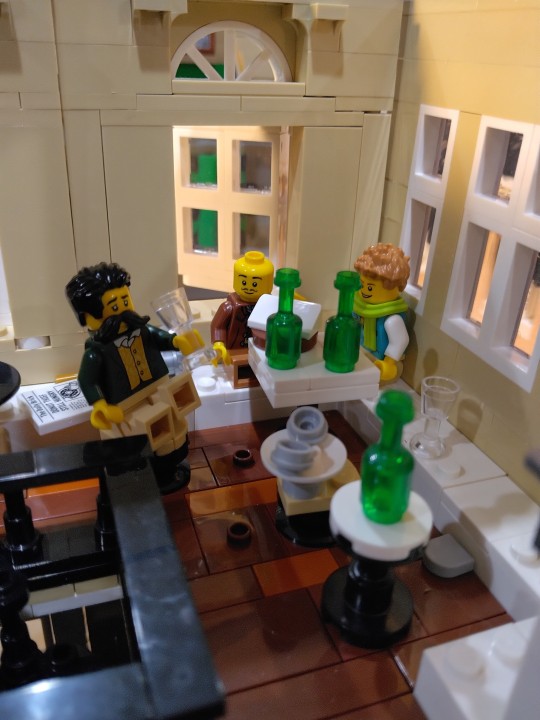
“I should hope so," retorted Laigle. "That's why we get on well together, my coat and I. It has acquired all my folds, it does not bind me anywhere, it is moulded on my deformities, it falls in with all my movements, I am only conscious of it because it keeps me warm. Old coats are just like old friends."
"That's true," ejaculated Joly, striking into the dialogue, "an old goat is an old abi” (ami, friend).
"Especially in the mouth of a man whose head is stuffed up," said Grantaire.
"Grantaire," demanded Laigle, "have you just come from the boulevard?"
"No."
"We have just seen the head of the procession pass, Joly and I."
"It's a marvellous sight," said Joly.
"How quiet this street is!" exclaimed Laigle. "Who would suspect that Paris was turned upside down? How plainly it is to be seen that in former days there were nothing but convents here! In this neighborhood! Du Breul and Sauval give a list of them, and so does the Abbé Lebeuf. They were all round here, they fairly swarmed, booted and barefooted, shaven, bearded, gray, black, white, Franciscans, Minims, Capuchins, Carmelites, Little Augustines, Great Augustines, old Augustines, there was no end of them."
"Don't let's talk of monks," interrupted Grantaire, "it makes one want to scratch oneself."
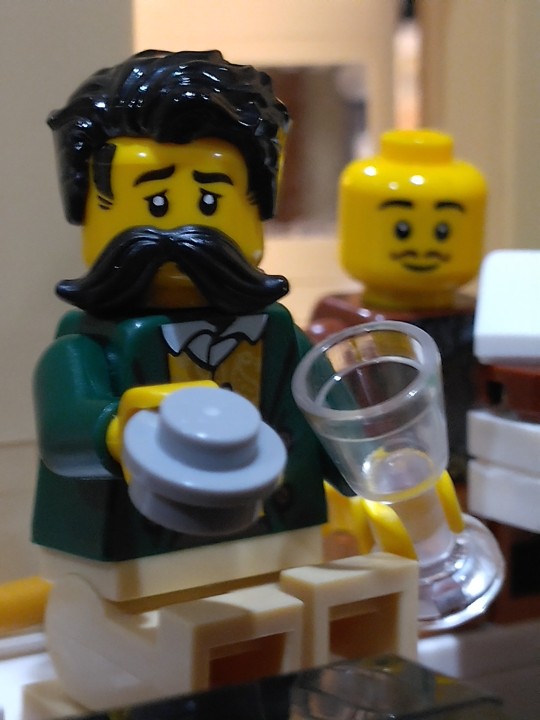
“Bouh! I've just swallowed a bad oyster. Now hypochondria is taking possession of me again. The oysters are spoiled, the servants are ugly. I hate the human race. I just passed through the Rue Richelieu, in front of the big public library. That pile of oyster-shells which is called a library is disgusting even to think of. What paper! What ink! What scrawling!
"And then, I met a pretty girl of my acquaintance, who is as beautiful as the spring, worthy to be called Floréal, and who is delighted, enraptured, as happy as the angels, because a wretch yesterday, a frightful banker all spotted with small-pox, deigned to take a fancy to her! Alas! woman keeps on the watch for a protector as much as for a lover; cats chase mice as well as birds. Two months ago that young woman was virtuous in an attic, she adjusted little brass rings in the eyelet-holes of corsets, what do you call it? She sewed, she had a camp bed, she dwelt beside a pot of flowers, she was contented. Now here she is a bankeress. This transformation took place last night. I met the victim this morning in high spirits. The hideous point about it is, that the jade is as pretty to-day as she was yesterday. Her financier did not show in her face. Roses have this advantage or disadvantage over women, that the traces left upon them by caterpillars are visible. Ah! there is no morality on earth. I call to witness the myrtle, the symbol of love, the laurel, the symbol of air, the olive, that ninny, the symbol of peace, the apple-tree which came nearest rangling Adam with its pips, and the fig-tree, the grandfather of petticoats. As for right, do you know what right is? The Gauls covet Clusium, Rome protects Clusium, and demands what wrong Clusium has done to them. Brennus answers: ‘The wrong that Alba did to you, the wrong that Fidenæ did to you, the wrong that the Eques, the Volsci, and the Sabines have done to you. They were your neighbors. The Clusians are ours. We understand neighborliness just as you do. You have stolen Alba, we shall take Clusium.’ Rome said: ‘You shall not take Clusium.’ Brennus took Rome. Then he cried: ‘Væ victis!’ That is what right is. Ah! what beasts of prey there are in this world! What eagles! It makes my flesh creep.”
He held out his glass to Joly, who filled it, then he drank and went on, having hardly been interrupted by this glass of wine, of which no one, not even himself, had taken any notice:—
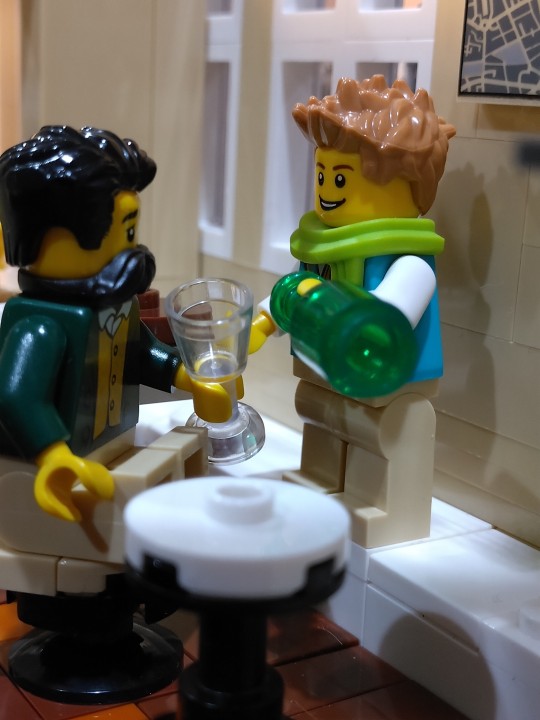
“Brennus, who takes Rome, is an eagle; the banker who takes the grisette is an eagle. There is no more modesty in the one case than in the other. So we believe in nothing. There is but one reality: drink. Whatever your opinion may be in favor of the lean cock, like the Canton of Uri, or in favor of the fat cock, like the Canton of Glaris, it matters little, drink. You talk to me of the boulevard, of that procession, et cætera, et cætera. Come now, is there going to be another revolution? This poverty of means on the part of the good God astounds me. He has to keep greasing the groove of events every moment. There is a hitch, it won’t work. Quick, a revolution! The good God has his hands perpetually black with that cart-grease. If I were in his place, I’d be perfectly simple about it, I would not wind up my mechanism every minute, I’d lead the human race in a straightforward way, I’d weave matters mesh by mesh, without breaking the thread, I would have no provisional arrangements, I would have no extraordinary repertory. What the rest of you call progress advances by means of two motors, men and events. But, sad to say, from time to time, the exceptional becomes necessary. The ordinary troupe suffices neither for event nor for men: among men geniuses are required, among events revolutions. Great accidents are the law; the order of things cannot do without them; and, judging from the apparition of comets, one would be tempted to think that Heaven itself finds actors needed for its performance. At the moment when one expects it the least, God placards a meteor on the wall of the firmament. Some queer star turns up, underlined by an enormous tail. And that causes the death of Cæsar. Brutus deals him a blow with a knife, and God a blow with a comet. Crac, and behold an aurora borealis, behold a revolution, behold a great man; ’93 in big letters, Napoleon on guard, the comet of 1811 at the head of the poster. Ah! what a beautiful blue theatre all studded with unexpected flashes! Boum! Boum! extraordinary show! Raise your eyes, boobies. Everything is in disorder, the star as well as the drama. Good God, it is too much and not enough. These resources, gathered from exception, seem magnificence and poverty. My friends, Providence has come down to expedients. What does a revolution prove? That God is in a quandry. He effects a coup d’état because he, God, has not been able to make both ends meet. In fact, this confirms me in my conjectures as to Jehovah’s fortune; and when I see so much distress in heaven and on earth, from the bird who has not a grain of millet to myself without a hundred thousand livres of income, when I see human destiny, which is very badly worn, and even royal destiny, which is threadbare, witness the Prince de Condé hung, when I see winter, which is nothing but a rent in the zenith through which the wind blows, when I see so many rags even in the perfectly new purple of the morning on the crests of hills, when I see the drops of dew, those mock pearls, when I see the frost, that paste, when I see humanity ripped apart and events patched up, and so many spots on the sun and so many holes in the moon, when I see so much misery everywhere, I suspect that God is not rich. The appearance exists, it is true, but I feel that he is hard up. He gives a revolution as a tradesman whose money-box is empty gives a ball. God must not be judged from appearances. Beneath the gilding of heaven I perceive a poverty-stricken universe. Creation is bankrupt. That is why I am discontented. Here it is the 4th of June, it is almost night; ever since this morning I have been waiting for daylight to come; it has not come, and I bet that it won’t come all day. This is the inexactness of an ill-paid clerk. Yes, everything is badly arranged, nothing fits anything else, this old world is all warped, I take my stand on the opposition, everything goes awry; the universe is a tease. It’s like children, those who want them have none, and those who don’t want them have them. Total: I’m vexed.
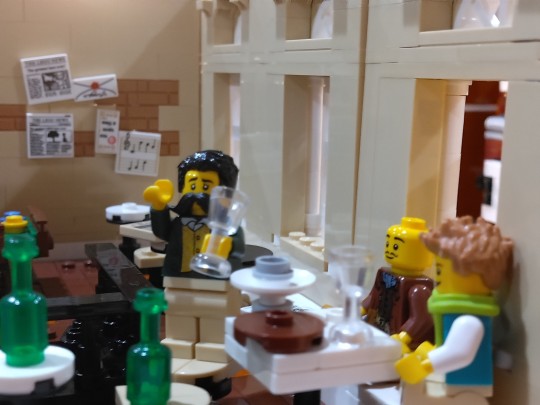
62 notes
·
View notes
Text
also i think the names of the months of the republican calendar are also very cute :-)
vendémiaire : month of wine harvest brumaire : month of mists frimaire : month of frost
nivôse : month of snow pluviôse : month of rains ventôse : month of wind germinal : month of sprouts floréal : month of flowers prairial : month of meadows messidor : month of harvests thermidor : month of summer heat fructidor : month of fruits
37 notes
·
View notes
Text
During the night of September 9 to 10, 1796: The Affair of the Grenelle Camp

Attaque du camp de Grenelle par des conspirateurs : le 24 Fructidor, An 4.eme de la République. Paris, BnF, département des estampes et de la photographie, 1802.
Hundreds of people, including a number of Babouvists, headed towards the Grenelle camp to try to incite the garrison to revolt. It didn’t work, and they were killed. The survivors and others identified as Babouvists would later be judged by a military commission, which, according to historian Jean-Marc Schiappa, appeared quite illegal, and whose judgments would eventually be overturned.
Here is a text excerpt from Schiappa: "Unlike the events of Prairial Year III, Vendémiaire Year IV, or the mutiny of the Police Legion, no real threat (in the military sense) existed here. Military means were used to crush a political opposition that had demonstrated it was disarmed. This is a form of coup d'état, the first in a long series under the Directory."
The most famous people executed were General Maximilien Henri Nicolas Jacob and three former convention members: Claude Javogues (apparently shot while singing the Marseillaise), Joseph-Marie Cusset (one of the last ‘Crêtois’), and Marc-Antoine Huguet. Among those sentenced to death were the former mayor Antoine-Marie Bertrand (despite several favorable testimonies on his behalf, apparently) and the painter Jean-Nicolas-Victor Gagnant. In total, around 30 people were executed by firing squad.
Here is an excerpt from historian Jean Tulard: "The Affair of the Grenelle Camp is the decisive episode of the Conspiracy of the Equals, led by Gracchus Babeuf. This former feudalist, who dreamed of an agrarian communism, was preparing a plot in collaboration with former Montagnards. After the failure of the Germinal and Prairial uprisings of Year III (April 1 and May 20, 1795), it was necessary to abandon the idea of a popular uprising because the suburbs were disarmed. The Babouvists, who had made contacts within a force responsible for maintaining order in Paris—the Police Legion—hoped for a military uprising in the Grenelle camp against the Directory. The denunciation by Grisel, an officer involved in the conspiracy, allowed the Minister of Police, Cochon de Lapparent, to orchestrate a massive crackdown on the 21st of Floréal Year IV (May 10, 1796). Babeuf and his key accomplices were arrested. The last supporters of the Equals tried, during the night of 23 to 24 Fructidor (September 9-10), to incite the soldiers of the Grenelle camp to revolt. Carnot, a member of the Directory at the time, and Cochon de Lapparent allowed the insurrection to develop before deploying the cavalry. Several people were killed on the spot, and thirty were executed. Babouvism was crushed. Its missteps, especially in the Grenelle affair where it was manipulated by provocateurs, were harshly criticized by Marx."
I will conclude with a quote from Jean-Marc Schiappa: "The coup at Grenelle is measurable: the Directory developed a taste for the army, and the sword that Sieyès would seek in Brumaire had already struck," and he adds, "the episode at Grenelle is also a turning point in the history of the Directory"
P.S: What I find in Gallica Trial of twenty-five individuals from the Grenelle Camp affair but it is in french sorry :( https://gallica.bnf.fr/ark:/12148/bpt6k41290c/f4.item
23 notes
·
View notes
Text
Rating: Mature Archive Warning: Major Character Death Fandoms: Les Misérables - All Media Types, Les Misérables - Victor Hugo Relationships: Grantaire & Éponine Thénardier, Grantaire & Les Amis de l'ABC, Floréal/Grantaire (Les Misérables) Characters: Grantaire (Les Misérables), Éponine Thénardier, Marius Pontmercy, Les Amis de l'ABC, Floréal (Les Misérables), Montparnasse (Les Misérables) Additional Tags: Alternate Universe - Modern Setting, Alternate Universe - Fleabag (TV) Fusion, Grief/Mourning, Guilt, Healing, Implied/Referenced Alcohol Abuse/Alcoholism, Implied/Referenced Suicide, POV Grantaire (Les Misérables), Angst, Recreational Drug Use
Chapter Summary:
Grantaire would like to say he hasn’t thought about Pontmercy or his weird friends at all since that disaster of an evening. He would like to say he hasn’t spent the past few days cringing at himself for what an asshole he had made of himself, and trying to forget how hollow he had felt on the walk home. He would also like to say that he’s 1.80 meters tall and changes his sheets more than twice a year, but those would all be lies.
22 notes
·
View notes
Text
Rating: Mature
Archive Warning: Major Character Death
Fandoms: Les Misérables - All Media Types, Les Misérables - Victor Hugo
Relationships: Grantaire & Éponine Thénardier, Grantaire & Les Amis de l'ABC, Floréal/Grantaire (Les Misérables)
Characters: Grantaire (Les Misérables), Éponine Thénardier, Marius Pontmercy, Les Amis de l'ABC, Floréal (Les Misérables), Montparnasse (Les Misérables)
Additional Tags: Alternate Universe - Modern Setting, Alternate Universe - Fleabag (TV) Fusion, Grief/Mourning, Guilt, Healing, Implied/Referenced Alcohol Abuse/Alcoholism, Implied/Referenced Suicide, POV Grantaire (Les Misérables), Angst, Recreational Drug Use
Chapter Summary:
Grantaire meets some people.
22 notes
·
View notes
Note
Is It true that Lebon gathered musicians to play music during the executions in Arras?
The the best source mentioning any such thing I’ve got so far is a letter from Armand Joseph Guffroy to Robespierre dated 18 floréal (May 7 1794), published in the former’s Les secrets de Joseph Lebon et de ses complices, released a few months after the fall of latter:
To relax, and to be consistent, you must this evening, or tomorrow at the latest, have Demeulier and his three companions freed from the Madelonnettes, to know for yourself the truth of what is happening in Arras. Listen and remember; these are Patriots oppressed by a Priest, who has been locked up like a madman, and who, when he could no longer be fanatic and superstitious, became a fanatical patriot through avarice, and caused patriotism and virtue to be hated by his extravagant conduct; or should I say, by his atrocious conduct. Know that, placed on the balcony of the comedy, on the fish market, (today Place de la Revolution), with his nose on the guillotine, he spoke with passion about the execution, and he ordered the tune ça ira to be played (il a fait jouer par la musique l’air ça ira). […]
Guffroy was Lebon’s archenemy, so this information should of course be treated with some caution. We know Guffroy was not an eye witness to this (but also that he did have contacts with people that could have been, such as Antoine Buissart and one Solon), that his goal with the letter is to get Robespierre to recall Lebon, increasing the chances he would lay it on thick in describing what he’s been up to (or could it instead be argued he would try to be as truthful as possible in order to get Robespierre to see how bad it really is?) and that stories about representatives on mission taking pleasure in watching the executions take place hardly is something unique for Lebon, and in some cases can be disproven (such as in the case of Collot d’Herbois, who almost certainly did not personally witness the shootings of condemned in Lyon).
Besides that, I found the following two testimonies from possible eye witnesses, both cited within this great blog post. The two are however written both 1, way after the fact, and 2, by people hostile to Lebon, making it hard to rule out the possibility their stories are embellished or even build on what Guffroy wrote in his report (although in the latter case, the part about the music is a very tiny detail among almost 500 pages, so it still seems a bit strange they would all pick exactly that detail to copy):
When any of his colleagues passed through Arras, [Lebon] always proposed their joining with him in a "partie de Guillotine", and the executions were perpetrated on a small square at Arras, rather than the great one, that he, his wife, and relations, might more commodiously enjoy the spectacle from the balcony of the theatre, where they took their coffee, attended by a band of music, which played while his human butchery lasted. A Residence in France during the years 1792, 1793, 1794 and 1795 (1798) by Charlotte Biggs.
Penetrating the crowd, which was thronging in the dark and winding streets, I soon reached the fish-market. Then the first object which struck my sight was the guillotine, raising its blood-red boards above the silent multitude. An old man, whom they had just tied to the fatal plank, was the victim; suddenly I heard the sound of trumpets. On a high place which overlooked the orchestra, was seated a man, still young, clad in a Carmagnole of black and blue stripes. This person, whose appearance announced monastic rather than military habits, was leaning carelessly on a cavalry sabre, the large hilt of which represented the Cap of Liberty; a row of pistols ornamented his girdle, and his hat, turned up in the Spanish fashion, was surmounted by a large tri-coloured cockade: I recognised Joseph Lebon. At this moment his mean countenance was animated with a horrid smile; he paused from beating time with his left foot; the trumpets stopped; he made a signal, and the old man was placed under the blade. A sort of clerk, half drunk, then appeared at the side of the " avenger of the people," and read with a hoarse voice a bulletin of the army of the Rhine and Moselle. At each paragraph the orchestra sounded a chord; and when the reading was concluded, the head of the wretched old man was stricken off amidst shouts of "Vive la republique!" repeated by the satellites of the ferocious Lebon. I shall never forget, nor can I adequately depict the impression of this horrible sight. I reached my father's house almost as lifeless as the miserable being whose agony had been so cruelly prolonged; and then I learnt that he was M. de Mongon, the old commandant of the citadel, condemned as an aristocrat. Memoirs of Eugène Vidocq (1829)
25 notes
·
View notes
Text

Floreal by José Pinazo Martínez, 1915
9 notes
·
View notes
Text
some more deep end commentary if anyone is interested !
the line in chapter 23 when floréal says "I once set my brother’s pants on fire while he was wearing them, it’s not like I have any room to talk." is based on something i did as a child (three guesses what i did)
in my very first attempts at drafting chapter 1, enjolras was a lawyer, and then a journalist.
originally, cosette and grantaire were only going to have 2 POV chapters each (back when i thought i could keep my chapter count somewhere in the 10-15 range). except i immediately fell in love with their POVs and kept giving them more simply because i could. but i did have to limit myself to 5 each or else i would have gone on forever from their POVs.
because of who i am as a person, there are a lot of references to aaron tveit. i'm not even writing aaronjolras in particular, i'm just referencing aaron tveit for fun. if anyone wants to know what these references are, i have an actual list. you know, like a normal person.
the main character's zodiac signs are as follows: enj: aquarius cosette: libra grantaire: cancer courfeyrac: aries marius: pisces
grantaire's nicknames for enjolras actually serve a purpose! he specifically calls enjolras by a nickname when he feels that enjolras is coming too close and he needs to put some space between them. it's the best way grantaire knows how, because it's the quickest and easiest way to annoy enjolras.
the painting When Tomorrow Comes almost had a different name — for a little while, i renamed her Love, the Future is Yours. i love that line very dearly in the brick and since enjolras was naming the painting, i thought, why not? ultimately i came back to When Tomorrow Comes, though, because my favorite thing that the musical does is the ending. i love how it choses to end on a hopeful note, with the line "it's the future that we bring when tomorrow comes," so the painting got her original name back <3
originally, it was not marius who told grantaire that enjolras loved him, but courfeyrac! i ended up changing it because i didn't think courfeyrac would betray enjolras' trust so willingly, not even in an attempt to fix up his love life.
this is the cranberries shirt enjolras stole from jehan and wears to karaoke:

bonus! some fun texts i sent while writing deep end:






#probably going to make a better post after i read all the way through but for now enjoy this random commentary#<3333#deep end tag#talking to strangers
11 notes
·
View notes
Text

Les Modes : revue mensuelle illustrée des arts décoratifs appliqués à la femme, no. 5, vol. 1, mai 1901, Paris. Robe de ville. Modèle Walles. Cliché Reutlinger. Bibliothèque nationale de France
II. — ROBE DE VILLE (Modèle Walles). — Robe Floréal en batiste blanche imprimée de gros pavots rouges sur fond jaune, incrustée de Valenciennes blanche et de cluny beurre. Ceinture en taffetas paille avec motifs pavots; empiècement au corsage de cluny beurre et petits rubans de velours noir. — Ombrelle assortie formant un bouquet de pavots.
II. — CITY DRESS (Wales model). — Floréal dress in white cambric printed with large red poppies on a yellow background, inlaid with white Valenciennes and butter cluny. Straw taffeta belt with poppy patterns; bodice yoke of butter cluny and small black velvet ribbons. — Matching umbrella forming a bouquet of poppies.
#Les Modes#20th century#1900s#1901#periodical#fashion#fashion plate#color#photograph#description#Bibliothèque nationale de France#dress#city#flower#Modèles de chez#Maison Walles#Reutlinger#may color plates
24 notes
·
View notes
Note
:Liberte-Egalite-Fraternite:
To the "men" of the CSP:
I would prefer it greatly if you stopped beheading my compatriots General Custine and General Houchard, and start with your "indispensable" idiot Representatives en Mission. Except Merlin de Thionville, he knows what he's doing.
Oh, and for the love of the Supreme Being, can you RECALL Turreau, Rossignol and Lescalle and STOP TRYING TO BEHEAD ME for not being bloodthirsty enough? These Vendéans are French people, damn your eyes; your viciousness against them is injust; allow them their priests and they will stop trying to fight the Republic!
~Jean-Baptiste Kleber, General de Division, Armee d'Ardennes, former Armee d'Ouest, 25 Floréal, an II
Hello Citizen Kleber. As you should have read in the introductory remarks, this committee is not in charge of sentencing people to the guillotine. (Somehow, this has become a common misconception.) The Revolutionary Tribunal were the ones who convicted Citizen Custine and Citizen Houchard. Similarly, we cannot guillotine our own representatives on mission. If you have specific concerns about their conduct, share them to us rather than making vague and sweeping denunciations.
Nobody here tried to behead you?! We literally gave you back your position after you cleared the investigation?? Speaking of, shouldn't you be in Charleroi right now, doing your job? If you're so concerned about the army's conduct, why aren't you monitoring it in person?
And for the last time, the priests can keep being priests. They just have to pay taxes and promise not to commit treason just because the Pope says so. You know, like every other citizen in this republic. We are aware that some of our ambassadors are not respecting this; I believe Citizen Robespierre is attempting to deal with the situation.
Now go back to Charleroi!
21 notes
·
View notes